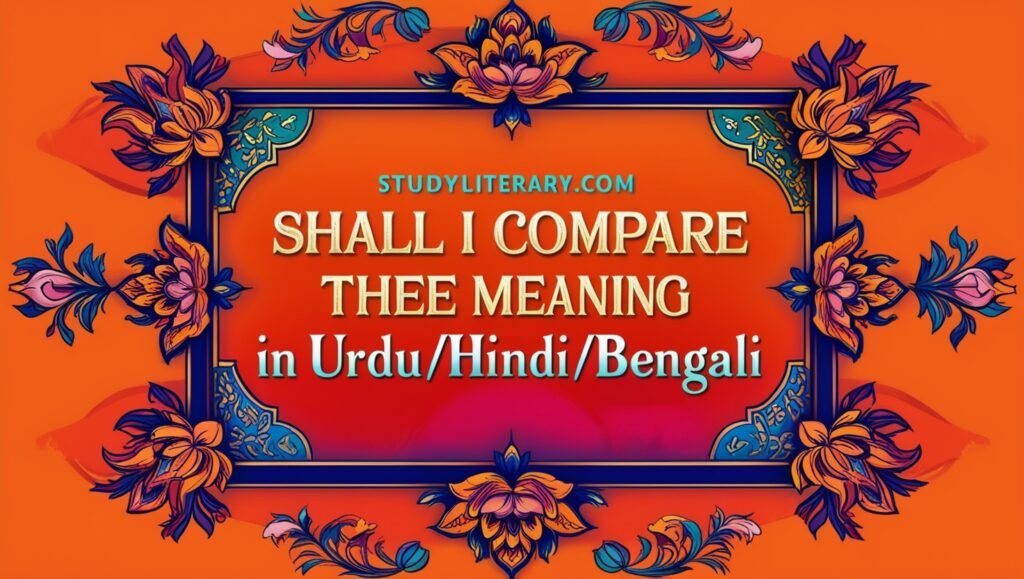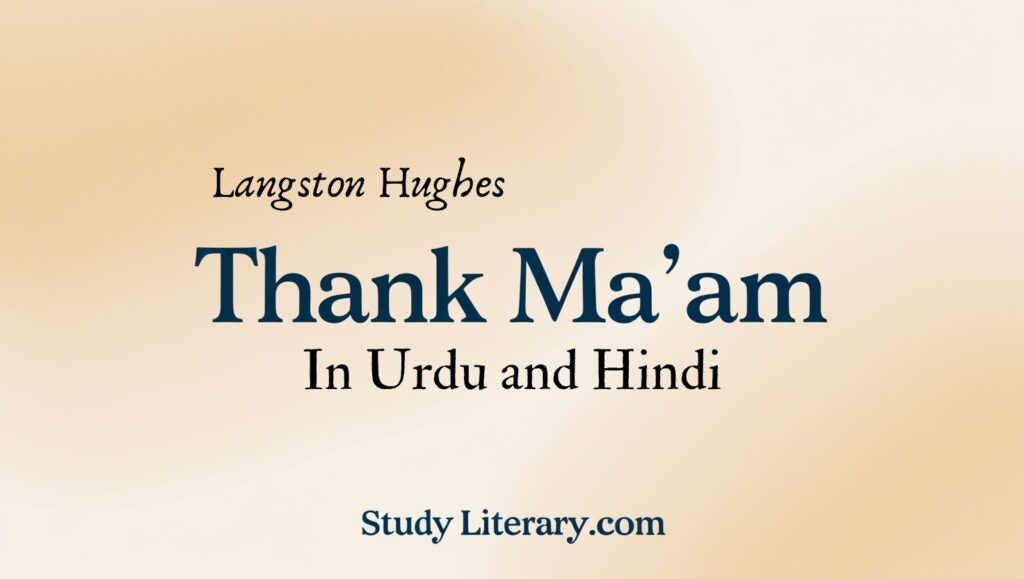Ultimate Exploration: Shall I Compare Thee meaning in Urdu/Hindi/Bengali - Best For Class 12 Students (WB)

William Shakespeare’s sonnets are timeless expressions of love, beauty, and human emotion. Among his most famous works is Sonnet 18, often referred to by its opening line, “Shall I compare thee to a summer’s day?” This sonnet, known for its eloquence and lyrical beauty, has captivated readers for centuries, transcending language barriers with translations that retain its poetic essence, with this article Shall I Compare Thee meaning in Urdu/Hindi/Bengali.
Table of Contents
ToggleShall I Compare Thee meaning in Urdu:
In Urdu, the translation of Shakespeare’s sonnets often seeks to maintain the lyrical quality and emotional depth of the English original. For “Shall I Compare Thee,” the challenge lies in finding words that convey the essence of a summer’s day and the timeless beauty of the beloved.
| English Word | Urdu |
|---|---|
| Famous | مشہور |
| Poet | شاعر |
| Dramatist | ڈرامہ نویس |
| Sixteenth century | سولہویں صدی |
| Sonnets | سانیٹ |
| Tragedies | المیے |
| Comedies | مزاحیہ |
| Historical plays | تاریخی ڈرامے |
| Noted works | مشہور کام |
| Wrote | لکھا |
| Fourteen lines | چودہ لائنیں |
| Rhymed couplet | ہم قافیہ جوڑا |
| Enquires | پوچھتا ہے |
| Theme | موضوع |
| Destruction | تباہی |
| Brought by time | وقت کی لائی ہوئی |
| Eternal quality | ابدی خوبی |
| Art | فن |
| Transcends | عبور کرتا ہے |
| Ravages | تباہی |
| Shall I compare thee | کیا میں تمہارا موازنہ کروں |
| Summer’s day | گرمی کا دن |
| Thou art | تم ہو |
| More lovely | زیادہ پیارا |
| More temperate | زیادہ معتدل |
| Rough winds | تیز ہوائیں |
| Shake | ہلانا |
| Darling buds | پیاری کلیاں |
| May | مئی |
| Lease | کرایہ |
| Too short | بہت مختصر |
| Date | تاریخ |
| Sometime | کبھی کبھار |
| Too hot | بہت گرم |
| Eye of heaven | آسمان کی آنکھ |
| Shines | چمکتا ہے |
| Often | اکثر |
| Gold complexion | سنہری رنگت |
| Dimmed | مدھم |
| Every fair | ہر خوبصورت |
| Declines | زوال پذیر ہے |
| Chance | اتفاق |
| Nature’s changing course | فطرت کا بدلتا راستہ |
| Untrimmed | غیر ترتیب شدہ |
| Thy eternal summer | تمہاری ابدی گرمی |
| Shall not fade | ماند نہ پڑے |
| Nor lose possession | نہ ہی قبضہ کھونا |
| Fair thou ow’st | تمہاری خوبصورتی |
| Death | موت |
| Brag | شیخی مارنا |
| Wander’st | گھومنا |
| Shade | سایہ |
| Eternal lines | ابدی لائنیں |
| To time | وقت کے ساتھ |
| Grow’st | بڑھنا |
| Men | انسان |
| Breath | سانس |
| So long | اتنی دیر تک |
| Live | زندہ رہنا |
| Give | دینا |
| Life | زندگی |
Shall I Compare Thee meaning in Hindi:
Hindi translations of Shakespeare’s sonnets strive to capture the poetic nuances and philosophical undertones of the original text. “Shall I Compare Thee” in Hindi reflects a quest for beauty and immortality through eloquent expressions that resonate with Hindi-speaking audiences.
| English Word | Hindi |
|---|---|
| Famous | प्रसिद्ध (Prasiddh) |
| Poet | कवि (Kavi) |
| Dramatist | नाटककार (Natakkar) |
| Sixteenth century | सोलहवीं सदी (Solahvi sadi) |
| Sonnets | सॉनेट (Sonnet) |
| Tragedies | त्रासदी (Tragedy) |
| Comedies | हास्य नाटक (Hasya natak) |
| Historical plays | ऐतिहासिक नाटक (Aitihasik natak) |
| Noted works | प्रसिद्ध कार्य (Prasiddh karya) |
| Wrote | लिखा (Likha) |
| Fourteen lines | चौदह पंक्तियाँ (Chaudah panktiyan) |
| Rhymed couplet | तुकबंदी युगल (Tukbandi yugal) |
| Enquires | पूछताछ करता है (Poocchtaach karta hai) |
| Theme | विषय (Vishay) |
| Destruction | विनाश (Vinaash) |
| Brought by time | समय द्वारा लाई गई (Samay dwara lai gai) |
| Eternal quality | शाश्वत गुण (Shashwat gun) |
| Art | कला (Kala) |
| Transcends | पार करता है (Paar karta hai) |
| Ravages | कहर (Kahar) |
| Shall I compare thee | क्या मैं तुम्हारी तुलना करूँ (Kya main tumhari tulna karun) |
| Summer’s day | गर्मी का दिन (Garmi ka din) |
| Thou art | तुम हो (Tum ho) |
| More lovely | अधिक प्यारे (Adhik pyare) |
| More temperate | अधिक मधुर (Adhik madhur) |
| Rough winds | कठोर हवाएं (Kathor havaayen) |
| Shake | हिलाना (Hilaana) |
| Darling buds | प्यारे कलियाँ (Pyaare kaliyan) |
| May | मई (May) |
| Lease | पट्टा (Patta) |
| Too short | बहुत छोटा (Bahut chhota) |
| Date | तारीख (Tareekh) |
| Sometime | कभी-कभी (Kabhi-kabhi) |
| Too hot | बहुत गर्म (Bahut garam) |
| Eye of heaven | स्वर्ग की आँख (Swarg ki aankh) |
| Shines | चमकता है (Chamakta hai) |
| Often | अक्सर (Aksar) |
| Gold complexion | सुनहरा रंग (Sunahara rang) |
| Dimmed | धुंधला (Dhundhla) |
| Every fair | प्रत्येक सुन्दर (Pratyek sundar) |
| Declines | गिरता है (Girtaa hai) |
| Chance | संयोग (Sanyog) |
| Nature’s changing course | प्रकृति का बदलता कोर्स (Prakriti ka badalta course) |
| Untrimmed | अपरिष्कृत (Aparishkrit) |
| Thy eternal summer | तुम्हारी शाश्वत गर्मी (Tumhari shashwat garmi) |
| Shall not fade | मुरझाएगा नहीं (Murjhaega nahi) |
| Nor lose possession | स्वामित्व नहीं खोएगा (Swamitva nahi khoyega) |
| Fair thou ow’st | तुम्हारी सुंदरता (Tumhari sundarta) |
| Death | मौत (Maut) |
| Brag | घमंड करना (Ghamand karna) |
| Wander’st | भटकना (Bhatakna) |
| Shade | छाया (Chhaya) |
| Eternal lines | शाश्वत पंक्तियाँ (Shashwat panktiyan) |
| To time | समय के साथ (Samay ke saath) |
| Grow’st | बढ़ना (Badhna) |
| Men | मनुष्य (Manushya) |
| Breath | सांस (Saas) |
| So long | इतनी देर तक (Itni der tak) |
| Live | जीना (Jeena) |
| Give | देना (Dena) |
| Life | जीवन (Jeevan) |
Shall I Compare Thee meaning in Bengali:
Bengali translations of Shakespeare’s sonnets emphasize the lyrical flow and musicality of the language. “Shall I Compare Thee” in Bengali evokes imagery of nature and enduring love, woven into the rich tapestry of Bengali literature and culture.
| English Word | Bengali |
|---|---|
| Famous | বিখ্যাত (Bikhyat) |
| Poet | কবি (Kabi) |
| Dramatist | নাট্যকার (Nattyokar) |
| Sixteenth century | ষোড়শ শতাব্দী (Shorosh shatabdi) |
| Sonnets | সনেট (Sonnet) |
| Tragedies | ট্র্যাজেডি (Tragedy) |
| Comedies | প্রহসন (Prohoson) |
| Historical plays | ঐতিহাসিক নাটক (Oitihashik natak) |
| Noted works | উল্লেখযোগ্য কাজ (Ullekhyojogyo kaj) |
| Wrote | লিখেছেন (Likhechhen) |
| Fourteen lines | চৌদ্দ লাইন (Chouddo line) |
| Rhymed couplet | ছন্দোবদ্ধ যুগল (Chhondobodho jugal) |
| Enquires | অনুসন্ধান করে (Onushondhan kore) |
| Theme | থিম (Theme) |
| Destruction | ধ্বংস (Dhongsso) |
| Brought by time | সময় দ্বারা আনা (Shomoy dwara ana) |
| Eternal quality | চিরন্তন গুণ (Chironton gun) |
| Art | শিল্প (Shilpo) |
| Transcends | ছাড়িয়ে যায় (Chhariye jay) |
| Ravages | ধ্বংসযজ্ঞ (Dhongssojojjo) |
| Shall I compare thee | আমি কি তোমার সাথে তুলনা করবো (Ami ki tomar shathe tulona korbo) |
| Summer’s day | গ্রীষ্মের দিন (Grishmer din) |
| Thou art | তুমি আছো (Tumi acho) |
| More lovely | আরও সুন্দর (Aro shundor) |
| More temperate | আরও মৃদু (Aro mridu) |
| Rough winds | রূক্ষ বাতাস (Rukkho batas) |
| Shake | কাঁপানো (Kapano) |
| Darling buds | প্রিয় কুঁড়ি (Priyo kudi) |
| May | মে (May) |
| Lease | লিজ (Lease) |
| Too short | খুব ছোট (Khup chhoto) |
| Date | তারিখ (Tarikh) |
| Sometime | কখনও কখনও (Kokhono kokhono) |
| Too hot | খুব গরম (Khup gorom) |
| Eye of heaven | স্বর্গের চোখ (Sworger chokh) |
| Shines | জ্বলে (Jwole) |
| Often | প্রায়ই (Prayi) |
| Gold complexion | সোনালি রঙ (Sonali rong) |
| Dimmed | ফিকে (Fike) |
| Every fair | প্রতিটি সুন্দর (Protiti shundor) |
| Declines | হ্রাস পায় (Hras pay) |
| Chance | সুযোগ (Shujog) |
| Nature’s changing course | প্রকৃতির পরিবর্তনশীল পথ (Prokritir poribortonshil poth) |
| Untrimmed | অপূর্ণ (Apurno) |
| Thy eternal summer | তোমার চিরন্তন গ্রীষ্ম (Tomar chironton grishmo) |
| Shall not fade | ম্লান হবে না (Mlan hobe na) |
| Nor lose possession | হারাবে না (Harabe na) |
| Fair thou ow’st | তোমার সৌন্দর্য (Tomar shundorjo) |
| Death | মৃত্যু (Mrityu) |
| Brag | গর্ব করা (Gorbo kora) |
| Wander’st | ঘোরাঘুরি করা (Ghoraghuri kora) |
| Shade | ছায়া (Chhaya) |
| Eternal lines | চিরন্তন লাইন (Chironton line) |
| To time | সময়ের সাথে (Shomoyer shathe) |
| Grow’st | বৃদ্ধি করা (Briddhi kora) |
| Men | মানুষ (Manush) |
| Breath | শ্বাস (Shash) |
| So long | ততক্ষণ পর্যন্ত (Totokhon porjonto) |
| Live | বাঁচা (Bancha) |
| Give | দেওয়া (Dewa) |
| Life | জীবন (Jibon) |
Additional Resource
- View “The Poetry of Earth” previous year question answer.
- Read “The Poetry of Earth” in Urdu/Hindi
- View “The Poetry of Earth” meaning in Urdu/Hindi/Bengali.
This exploration of Shall I Compare Thee meaning in Urdu/Hindi/Bengali serves as a testament to Shakespeare’s literary genius and his ability to touch hearts and minds around the globe. Keep visiting our website, studyliterary.com, for more insightful articles and study guides.
- Facebook
- Twitter
- Linkedin
- Whatsapp
- Telegram
- Pinterest


